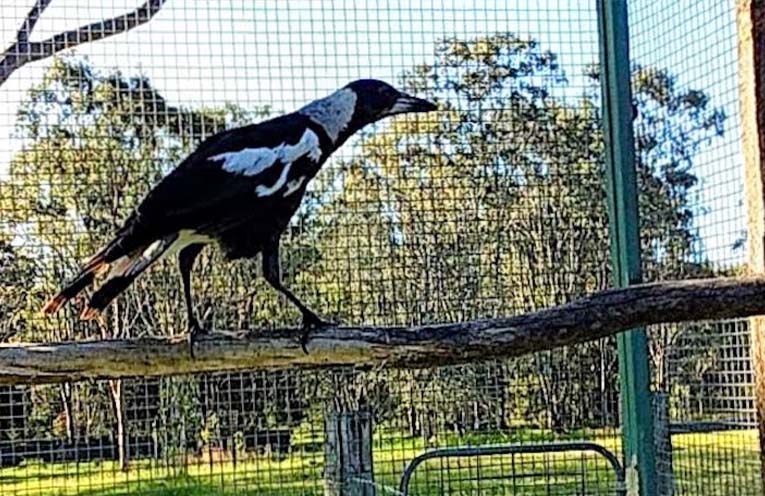
THE remains of magpies found dead or dying on a Bonny Hills lawn will undergo further forensic testing after an initial investigation found “no obvious reason for death”.
Eight native birds were discovered by a dog walker last Tuesday, 19 November.
 Advertise with News of The Area today.
Advertise with News of The Area today.It’s worth it for your business.
Message us.
Phone us – (02) 4981 8882.
Email us – media@newsofthearea.com.au
Six were dead, a seventh died later, while a sole survivor was being cared for until it could be released.
The wildlife rescue group For Australian Wildlife Needing Aid (FAWNA) was notified, with Lake Cathie volunteer Ray Ashton responding.
He told News Of The Area that more than five deaths are considered a concentrated or “mass mortality event” and require investigation under biosecurity regulations.
“The advice from Taronga Conservation Society was to retrieve them,” he said.
“So I took them in a styrofoam container to the Bonny Hills Vet, where they filled out documents in preparation for an organised pick-up.”
Taronga completed their tests earlier this week advising that they had not found a cause of death.
However, samples were being forwarded to another body for the exclusion of Avian Influenza (HPAI).
Mr Ashton said he found the deaths “unusual but not unheard of” and noted there had been no other reported bird deaths in the area.
Earlier this month, the Environment Protection Authority (EPA) released the results of testing on magpies that had been found dead across two residential streets in Cootamundra.
The tests ruled out Avian Influenza but were otherwise inconclusive.
“We cannot confirm whether the birds died from a poisoning incident or from naturally occurring diseases such as ‘black and white bird syndrome’, of which paralysis and weakness are primary symptoms,” EPA Director of Operations Scott Kidd said.
“What the testing does show, however, is that chemicals found in the samples have historically been used in two banned pesticides – DDE and Dieldrin.”
FAWNA spokesperson Kym Kilpatrick said the Mid North Coast-based organisation had received calls for more than 25 peewees and 100 sick, injured, orphaned or poisoned magpies, in the last few months.
There is nothing at this stage, however, to suggest that the Bonny Hills deaths are the result of pesticide use.
Pesticide alternatives
Magpie diets are similar to that of the kookaburra and tawny frogmouth owl.
FAWNA describes them as a natural solution to lawn grubs and Christmas beetles (which are in decline).
“Magpies with their super-powered hearing are able to identify their faint chewing sounds and therefore quickly locate, dig up and digest these lawn munchers,” Ms Kilpatrick said.
“Alternatively, if you dig them up and donate them to your local magpies, they will recognise you as a friend not foe, and you will be safe from swooping for years to come.
“Armyworms or grubs are the caterpillars of moths and emerge at night with a particular fondness for couch and kikuyu lawns.
“These can be detected by applying a mix of dishwashing detergent and water (30 ml to nine litres).
“After a few minutes, the armyworms should surface and can be safely picked off.
“Likewise, leaving a damp towel on the lawn overnight should attract armyworms.
“Choosing lawns grasses apart from couch, which can become aggressively weedy, or kikuyu which can throw off cyanide gases, is another preventative alternative.
“Japanese beetle grubs can be managed safely with biological controls of beneficial nematodes, developed by CSIRO as safe to use in Australian conditions, and available from a number of online sources.”
FAWNA Helpline: 65814141
By Sue STEPHENSON